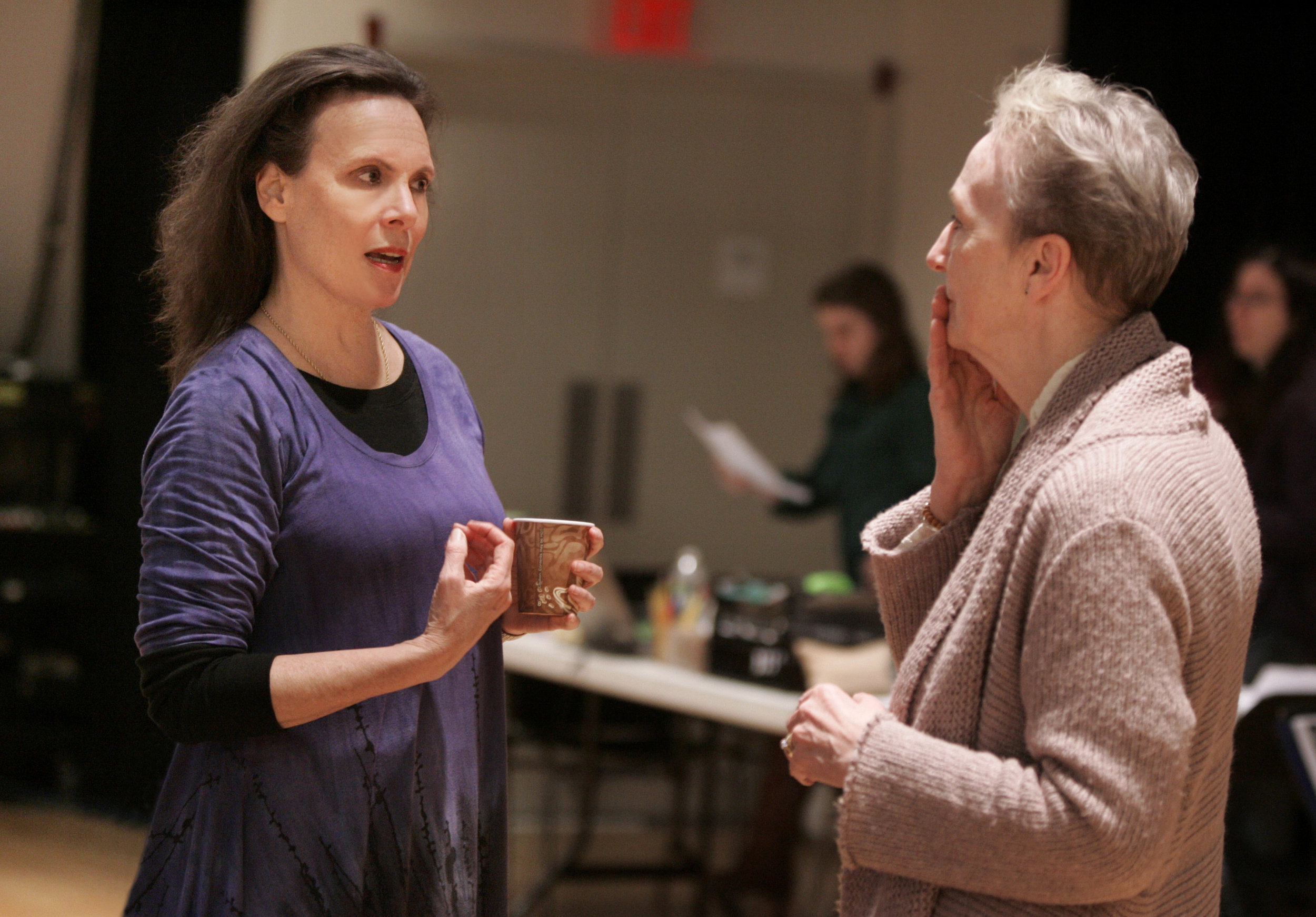Emily Mann: Poised to open Albee’s “Delicate Balance” at McCarter Theatre

“A Delicate Balance” is one of Edward Albee’s greatest works. The play takes us inside the lives of Agnes and Tobias, whose precarious suburban lives are shaken when they find themselves facing unexpected houseguests who plan to stay indefinitely. It premiered on Broadway in 1966 and won the Pulitzer Prize for Drama the following year. Thirty years after the original staging, an outstanding production by Lincoln Center Theater earned the 1996 Tony and Drama Desk awards for best revival of a play.
McCarter Theatre Center in Princeton is bringing the play back to life with a stellar cast that includes two-time Obie Award winner and Tony nominee Kathleen Chalfant (Agnes), Tony Award winner John Glover (Tobias), Penny Fuller, Roberta Maxwell, James A. Stephens, and Francesca Faridany. The production is directed by McCarter’s longtime artistic director Emily Mann, a playwright whose works include “Having Our Say” and “Execution of Justice.”
“A Delicate Balance” runs Jan. 18 through Feb. 17, and continues the close relationship that Mann and the McCarter have shared with Albee over the years. In the last two decades, McCarter Theatre has produced his “Marriage Play,” “All Over” and the world premiere of “Me, Myself & I.” In addition, Mann (who directed the last two plays) was honored with the Edward Albee Last Frontier Playwright Award in 2003.
Jersey Arts recently had the opportunity to talk with Mann about the play, Albee’s place in theater history, and her 23-season journey with McCarter.
Jersey Arts: Many people would argue that “A Delicate Balance” is Edward Albee’s finest play. Where does this play rank in his body of work for you?
Emily Mann: For me, it’s his masterpiece and it’s my favorite. When I first got to McCarter, I called him and asked if I could do it, but he had just given the rights to Lincoln Center, literally that week. I had just missed it. I’ve wanted to do it ever since, but then Edward gave me a premiere here and then another and I did “All Over,” which is another play of his that I loved. Finally, I thought that it had been enough time between that brilliant revival on Broadway, so I asked if it was time now. I asked Edward and he said, ‘let’s do it,’ and here we are.
JA: I think it’s fair to say he’s made it up to you over the years.
EM: I think he knew you couldn’t do it too soon after that production. You just couldn’t.
JA: “A Delicate Balance” has had such a wonderful history, from winning the Pulitzer to the 1996 Tony Award for top revival. As a director, what are the challenges of bringing such a celebrated work back to life?
EM: Well, it is a big challenge. You want to make sure there’s a reason you’re doing it and that it’s not the other production. The previous actors have put their stamp on the roles, so it comes down to each person having to find and redefine the role from who they are.

JA: Have you worked with the actors in the cast before?
EM: I have worked with John Glover before. I’ve done readings and things with Kathleen Chalfant, but I’d never worked with her in a full rehearsal piece before. ... And Francesca Faridany has been at McCarter a lot and she’s married to a man who is like my brother, so we’re very good friends. She’s often been here at McCarter, but I’ve never actually directed her myself— her husband has. The cast is kind of familial.
JA: One of the most fascinating aspects about a production like this for me is that unlike so many of the legendary playwrights throughout history, Albee is still with us. You’re actually able to work with him and get his input. As an artistic director and a playwright yourself, what is it like to have that presence in the room?
EM: It’s incredible! What an incredible privilege, can you imagine? I mean, for any director to be in the room with Edward Albee working on what I consider to be his masterpiece ... can you imagine any higher honor for a director or artistic director in the American theater? I can’t. I really can’t.
It’s just amazing. When I look back upon my life and I think about the things that I have been able to do in my life and my work and things like this, I realize that I’m actually living the life that I dreamed of living when I was a little girl. I just feel extremely fortunate. For me, the greatest inspirations include (Eugene) O’Neill and (Tennessee) Williams and (Arthur) Miller and Albee and perhaps (August) Wilson, and they’re all gone except for Edward.
JA: When I think about Albee’s plays, the first thing that comes to mind is how they really are anti-politically-correct productions. They reveal truths you don’t see anywhere else and they can reveal those truths in rather disturbing ways. How would you describe his work?
EM: Well, he is one of the greatest playwrights — certainly of those alive, but also in the American canon. He’s often said that he wants to write what he calls “necessary plays,” which say important things to people in the audience. “Look at this and maybe you can change” is partly in his mind in a lot of his plays. He’s amazingly honest and can be brutally honest, but he’s also brutally and viciously funny. His characters often have senses of humor or they don’t, which makes it funny. And he makes the plays so they are an incredibly witty and literate experience. They are very much grounded in the emotionally moment to moment, which seems like reality but isn’t a heightened reality. It’s a highly theatrical experience. You wind up being stimulated mind and heart and, hopefully, even deeper. He wants to shake people up on a really deep level that sometimes goes beyond the conscience.
JA: I know you’ve brought a number of productions from Princeton to New York City in the past. Are there any plans for this show to continue on?
EM: Umm ... we’ll see. There is talk. I’m not being coy, there are discussions, but no definite move is planned at the moment.
JA: Has your proximity to New York City and Broadway helped you stay at McCarter all these years? You’re a couple of years away from your 25th anniversary in Princeton. Has this location allowed you to steer a great regional theater while providing you access to the highest level in the field?
EM: It’s been great. Just to be able to get the talent from Broadway and off-Broadway and even L.A. — the top-level directors, actors, playwrights here. ... I’m in and out of the city all of the time. ... It’s made me able to put McCarter at the top of the field. And doing so has been very gratifying and satisfying for me. It’s been a great run.
JA: I know that everyone in theater knows your name and your background, but does popping in and out of the city — meeting people face to face — help you convince people to be part of productions at McCarter?
EM: Oh sure. It allows me to stay in the center of the scene. I was talking to a couple of people doing readings for me recently and one was a rather big movie star. I said, “Would you consider working out of town?” and he replied, “Well, I don’t consider McCarter out of town!”
McCarter Theatre Center (mccarter.org) is at 91 University Place in Princeton. “A Delicate Balance” runs from Jan. 18 to Feb. 17, with opening night on Jan. 25. Tickets range from $20-$65, (609) 258-2787.
